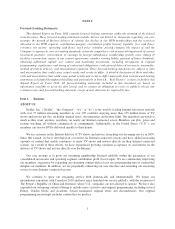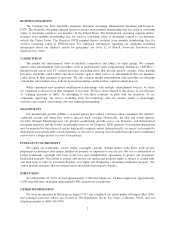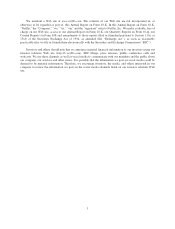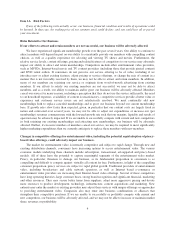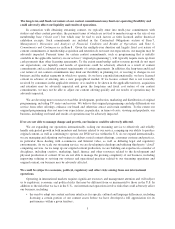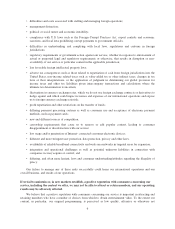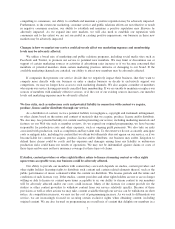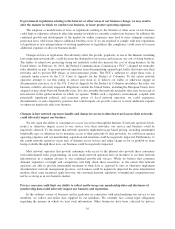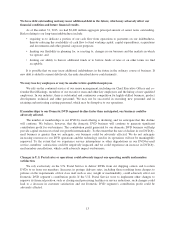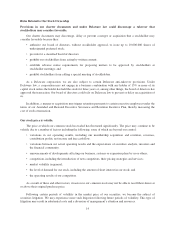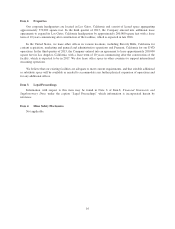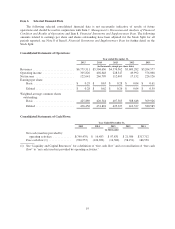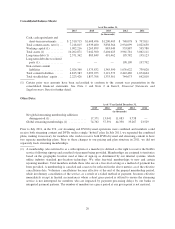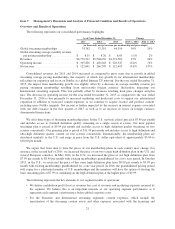NetFlix 2015 Annual Report Download - page 15
Download and view the complete annual report
Please find page 15 of the 2015 NetFlix annual report below. You can navigate through the pages in the report by either clicking on the pages listed below, or by using the keyword search tool below to find specific information within the annual report.groups and governmental bodies for attempts to link personal identities and other information to data collected on
the Internet regarding users’ browsing and other habits. Increased regulation of data utilization practices,
including self-regulation or findings under existing laws that limit our ability to collect and use data, could have
an adverse effect on our business. In addition, if we were to disclose data about our members in a manner that
was objectionable to them, our business reputation could be adversely affected, and we could face potential legal
claims that could impact our operating results. As our business evolves and as we expand internationally, we may
become subject to additional and/or more stringent legal obligations concerning our treatment of customer and
other personal information, such as laws regarding data localization and/or restrictions on data export. Failure to
comply with these obligations could subject us to liability, and to the extent that we need to alter our business
model or practices to adapt to these obligations, we could incur additional expenses. For instance, in October
2015, the European Court of Justice overturned the E.U./U.S. Safe Harbor Program, under which companies
were able to transfer personal data from the E.U. to the U.S. in a legally compliant manner. If other legally
compliant forms of data transfer are similarly invalidated by courts or other authorities in the E.U., we may need
to alter our business practices, and which may adversely affect our business.
Our reputation and relationships with members would be harmed if our membership data, particularly
billing data, were to be accessed by unauthorized persons.
We maintain personal data regarding our members, including names and billing data. This data is
maintained on our own systems as well as that of third parties we use in our operations. With respect to billing
data, such as credit card numbers, we rely on licensed encryption and authentication technology to secure such
information. We take measures to protect against unauthorized intrusion into our members’ data. Despite these
measures we, our payment processing services or other third party services we use such as AWS, could
experience an unauthorized intrusion into our members’ data. In the event of such a breach, current and potential
members may become unwilling to provide the information to us necessary for them to become members.
Additionally, we could face legal claims for such a breach. The costs relating to any data breach could be
material, and we currently do not carry insurance against the risk of a data breach. For these reasons, should an
unauthorized intrusion into our members’ data occur, our business could be adversely affected.
We are subject to payment processing risk.
Our members pay for our service using a variety of different payment methods, including credit and debit
cards, gift cards, direct debit and online wallets. We rely on internal systems as well as those of third parties to
process payment. Acceptance and processing of these payment methods are subject to certain rules and
regulations and require payment of interchange and other fees. To the extent there are disruptions in our payment
processing systems, increases in payment processing fees, material changes in the payment ecosystem, such as
large re-issuances of payment cards, delays in receiving payments from payment processors and/or changes to
rules or regulations concerning payment processing, our revenue, operating expenses and results of operation
could be adversely impacted. In addition, from time to time, we encounter fraudulent use of payment methods,
which could impact our results of operation and if not adequately controlled and managed could create negative
consumer perceptions of our service.
If our trademarks and other proprietary rights are not adequately protected to prevent use or
appropriation by our competitors, the value of our brand and other intangible assets may be diminished,
and our business may be adversely affected.
We rely and expect to continue to rely on a combination of confidentiality and license agreements with our
employees, consultants and third parties with whom we have relationships, as well as trademark, copyright,
patent and trade secret protection laws, to protect our proprietary rights. We may also seek to enforce our
proprietary rights through court proceedings. We have filed and we expect to file from time to time for trademark
and patent applications. Nevertheless, these applications may not be approved, third parties may challenge any
copyrights, patents or trademarks issued to or held by us, third parties may knowingly or unknowingly infringe
11


